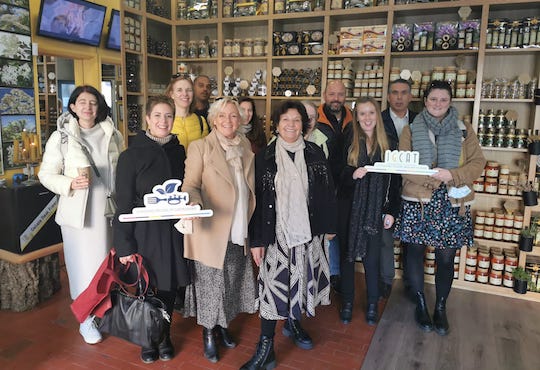Minho, European Region of Gastronomy awarded 2016 welcomed the European Region of Gastronomy Platform on 30 November 2021 to discuss the importance of sustainability and cross-marketing for member regions.
Organised in the framework of the 23rd European Region of Gastronomy Platform meeting, the field visit was hosted by Executive Coordinator of the Consorcio MinhoIn, Francisco de Calheiros in collaboration with the municipality of Ponte de Lima.
Platform members had the chance to learn about the work of Apiagro honey extraction company and its efforts to combine tradition, creativity and sustainability to develop unique, high-quality, honey-based products. The main discussion points included the urgency to better promote honey and protect pollinators, as well as the challenges for small producers to cater for international visitors.
At the Centre of Interpretation and Promotion of the Vinho Verde, part of the Iter Vitis Cultural Route of the Council of Europe, the Platform was invited to reflect on the importance of international collaboration and cross-marketing to reinforce local destinations, thanks to the Director of the Centre, Cristiana Freitas.
Moreover, a conversation on sustainability and its possible indicators was opened with the intervention of sustainability expert and consultant, Isabel Freitas Loureiro, General Coordinator of Guimarães 2030 Mission Structure, a sustainable development strategy for territory and citizens transformation towards a near zero carbon society.
Following a lunch with the Mayor of Ponte de Lima, Victor Mendes, the Platform met at Paço de Calheiros where Jaume Gomila and May Britt Hansen presented the programmes for Menorca and Trondheim-Trøndelag, European Regions of Gastronomy awarded 2022. Afterwards, a live online connection was established with Saimaa region in Finland to sign the Protocol Agreement for to become a member of the European Region of Gastronomy Platform.
The day concluded with a conversation involving Ana Maria Barata, Coordinator of the Portuguese Genebank (BPGV) at the National Institute of Agrarian and Veterinary Research (INIAV) in Braga, and Joana Nogueira, Professor at the School of Agriculture of Ponte de Lima (ESA – IPVC). This exchange encouraged Platform members to reflect on the need to preserve and promote local plant and animal varieties not only through their conservation, but also by ensuring that their traditional uses are kept alive.
About the European and World Regions of Gastronomy
Candidate and awarded European and World Regions of Gastronomy, guided by IGCAT, are working together to strengthen food security through the celebration of distinctive food cultures; create employment by stimulating creativity and gastronomic innovation; nourish children and adults through culinary and cultural education; drive environmental sustainability in tourism, hospitality and agricultural sectors; support balance and sustainable tourism practices; highlight and support expertise from within rural and urban communities, creating connections and sharing good practises; and contribute to community health and well-being.
About IGCAT
IGCAT aims to empower local communities by raising awareness of the importance to protect and promote distinct regional food, culture, arts and natural assets as part of sustainable and balanced tourism and development strategies. This is essential to safeguard our planet, health, wellness and local economies.
IGCAT is a non-profit institute established in 2012, working with regional stakeholder consortiums in the fields of gastronomy, culture, arts and tourism. It counts on the expertise of a worldwide network of experts and works in partnership with specialised intergovernmental organisations.
IGCAT founded the European and the World Region of Gastronomy Award and is the official secretariat for the European and World Regions of Gastronomy Platform. Furthermore, the Institute has developed the European Young Chef Award, the European Food Gift Challenge, the Top Websites for Foodie Travelers and the Food Film Menu.
7 diciembre 2021
